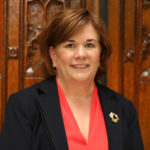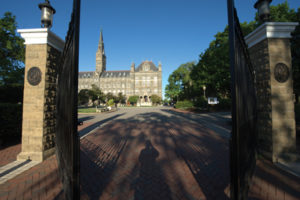Launching a Career in International Affairs
THIS GUIDE IS NO LONGER ACTIVE. For the current FP Guide, click here.
Georgetown University,
Walsh School of Foreign Service
Anne Steen, director of the Graduate Career Center at Georgetown University’s Walsh School of Foreign Service (SFS), has long encouraged students to have a backup career plan. But starting this year, job searches may require casting a wider net. “In addition to a Plan A and a Plan B, you probably need to look at having a Plan C,” she says.
Having a Plan C may be especially important for those who aspire to traditional international relations roles in public service. Of the 97 percent of SFS class of 2016 graduates who are now employed full time, 39 percent are working in the public sector. This includes graduates interested in joining the U.S. Foreign Service, who typically account for 4 percent to 5 percent of each year’s SFS graduating class.
A student who aspires to work in, say, international development or refugee resettlement might have a Plan A focusing on U.S. government employment and a Plan B targeting nonprofit organizations funded by government grants. Since grant funding has been decreasing for some nonprofits, a strategic Plan C might focus on the private sector. “Many consulting firms concentrate on emerging markets and engage in development work focused on helping local governments abroad,” says Steen. Jobs are sometimes based overseas.

“IN ADDITION TO A ‘PLAN A’ AND A ‘PLAN B,’ YOU PROBABLY NEED TO LOOK AT HAVING A ‘PLAN C.’” – Anne Steen, Director, Graduate Career Center, Walsh School of Foreign Service (SFS), Georgetown University
One key to obtaining public sector employment is to find out who is getting funded. “Students need to follow the funding,” says Steen. “Our office now needs to follow that more closely than ever, whether the jobs are in security, immigration, or elsewhere. We will have a staffer monitoring funding trends on a weekly basis.”
Federal contracts with consulting firms often call for expertise in management strategy to deal with a challenge such as an infrastructure problem. To identify firms receiving government contracts, Steen suggests reading a local business publication, such as the Washington Business Journal.
SFS is also monitoring developments that could lead to more restrictive visa policies affecting U.S. employment prospects for international students. “International students are a very important part of our community here at Georgetown, but it is also incumbent on us to give them realistic information regarding employment opportunities,” says Steen. “An international student’s Plan A might be to work in the U.S. after graduation. Plan B might be to return to his or her home country. For Plan C, we might ask, ‘Where else do you have work authorization?’”

Georgetown University
SFS students may meet individually with a career coach as often as they wish. In fact, alumni may do so as well. “Twenty-five percent of those who walk in our door are alumni,” says Steen. “For example, someone who is retiring from the State Department may be seeking an encore career.” Thanks to recent increases in SFS Graduate Career Center staff, coaches will have increased time for one-on-one counseling and to support programs that have led to a 65 percent increase in employer visits to campus this year.
For more information see the Program Directory
Contents
- Launching a Career in International Affairs
- New York University School of Professional Studies (NYUSPS), Center for Global Affairs (CGA)
- Georgetown University, Walsh School of Foreign Service (SFS)
- UC San Diego, School of Global Policy and Strategy (GPS)
- Johns Hopkins University (JHU), School of Advanced International Studies (SAIS)
- The Fletcher School of Law and Diplomacy at Tufts University
- Statecraft Simulations